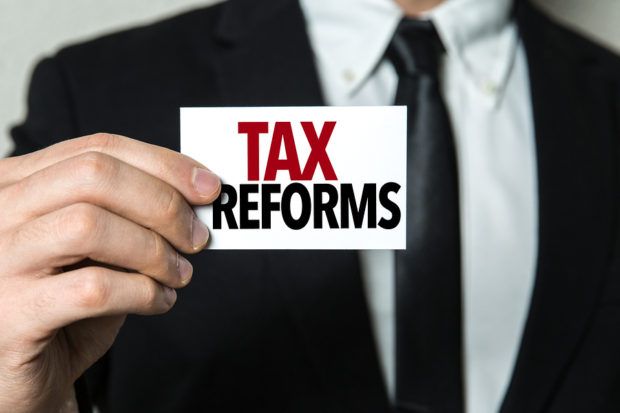 A cadre of U.S. insurers and reinsurers stand to gain from lower corporate tax rates advocated by President Donald Trump and Republican members of Congress as part of a broader reform effort, Morningstar said in a new report.
A cadre of U.S. insurers and reinsurers stand to gain from lower corporate tax rates advocated by President Donald Trump and Republican members of Congress as part of a broader reform effort, Morningstar said in a new report.
“Tax reform could shift market share from Bermudian to U.S. reinsurers. The positive impact on insurers is quite varied, based on company positioning, and we see Progressive, W.R. Berkley and Travelers as the biggest winners,” Morningstar said in its report.
Morningstar believes that the most likely tax reforms would involve an increase of the carried interest tax rate from 23.8 percent to 33 percent, with corporate tax rates declining, on average, to the low 20 percent range. Why would this benefit U.S. insurers and reinsurers? That would be because the benefits of the Bermuda reinsurance market and its low tax rates would be evened out in comparison with U.S. corporate tax reforms.
“Significantly lowering the U.S. tax rate could help to level this playing field and push some reinsurance underwriting back into the U.S., allowing domestically domiciled reinsurers to gain share,” Morningtar’s report notes. “While the tax disadvantage with Bermuda would not be completely closed, the reinsurance market is currently dominated by Europe, where tax rates are generally at or above the recently proposed U.S. tax rates, suggesting lower tax rates could make the U.S. a much more material player.”
Currently the U.S. holds 10 percent of the global market in the property/casualty insurance industry, because the Bermudian reinsurance market in P/C insurance lines (larger scope, lack of corporate taxes, low employees needed) makes it easy for operations to domicile their operations there, Morningstar said.
Morningstar said that lower tax rates would help U.S. insurers fully based in the country such as Progressive and Allstate, giving them avenues to more business. GEICO would also benefit, too, according to the report. W.R. Berkley stands to gain as well because nearly 80 percent of its premiums stem from its domestic primary segment, and its reinsurance business would be among those that gain from lower tax rates, according to the report.
Trump Tax Reform Won’t Help All Insurers
Other insurers, such as Chubb and AIG, would see challenges from lower U.S. corporate taxes, Morningstar said.
Chubb has 40 percent of its premiums generated outside of the U.S. and Morningstar sees its Swiss domicile as experiencing “relatively little benefit” as a result. AIG and its large international footprint also stands to limit any gains for the struggling insurer though. Another reason why: $15.6 billion in deferred tax assets on AIG’s balance sheet. Morningstar noted that the company has already warned a reduction to a 20 percent tax rate “would force the company to record a $6 billion impairment to its” deferred tax assets. That said, Morningstar points out that this is an accounting hit rather than cash flow, and that its valuation would not be affected by the write-down.
Morningstar said that Travelers offers the best potential after tax reform. With its fairly valued stock under existing tax rules, the firm points out that the company stands to gain because 93 percent of its premiums are generated in the U.S.
In a similar assessment, Standard & Poor’s has said that some of the early tax reform proposals could make the U.S. a more attractive corporate climate for both insurers and reinsurers. One proposal cited by S&P would slash corporate taxes to 15 percent from the current 35 percent, leveling the playing field between U.S. and Bermuda. If this happens, Standard & Poor’s said it sees some Bermuda-based companies potentially reassessing where they keep their tax domicile.
Morningstar’s report was relatedly cheeky compared to other industry analyst documents. The full piece carries a title that refers obliquely to Trump’s Twitter language ticks: “The Financial Sector Tax Reform Impact: So much Winning, It’s Yuge.”
The report’s subtitle: “Not everyone wins the same; some will be (relative) losers. Sad!”
Beyond insurance, Morningstar also looked at the broader financial sector.
Source: Morningstar





















 Retired NASCAR Driver Greg Biffle Wasn’t Piloting Plane Before Deadly Crash
Retired NASCAR Driver Greg Biffle Wasn’t Piloting Plane Before Deadly Crash  Beazley Agrees to Zurich’s Sweetened £8 Billion Takeover Bid
Beazley Agrees to Zurich’s Sweetened £8 Billion Takeover Bid  Earnings Wrap: With AI-First Mindset, ‘Sky Is the Limit’ at The Hartford
Earnings Wrap: With AI-First Mindset, ‘Sky Is the Limit’ at The Hartford  Preparing for an AI Native Future
Preparing for an AI Native Future 





